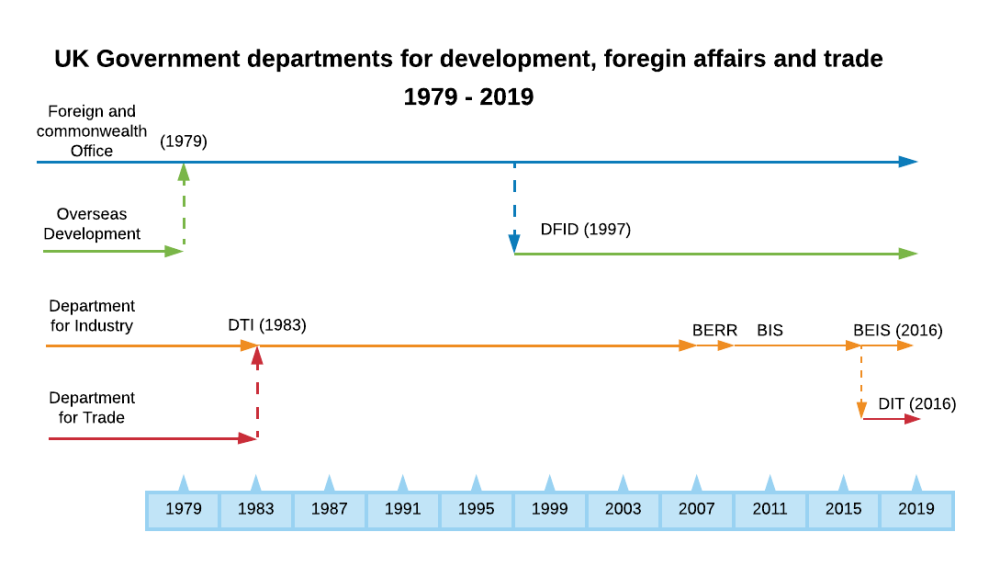Rumours have re-surfaced—perhaps as a result of Treasury kite-flying—that the Government is considering merging its international-facing Departments as part of the coming spending review. We’ve argued in the past that the best approach to development policy is through an integrated approach to aid, trade and foreign policy. But merging DFID into the FCO at this time would be likely to diminish the UK’s global influence, damage its development effectiveness, and work against the idea of Global Britain.
This blog post looks at the recent evidence on similar mergers, the costs, and the likely impacts on UK influence. It concludes with alternative proposals for improving efficiency and effectiveness.
Learning from experiences in Australia, Canada, Denmark, and beyond
The UK is now unique amongst its peers in maintaining a separate development Ministry responsible for policy and delivery headed by a cabinet Minister. In 2013, Australia and Canada both moved their development agency into ministries of foreign affairs and trade, and Denmark’s was absorbed into its foreign ministry in the late 90s.
The wider evidence on the effectiveness of these approaches is limited—not least because the it is difficult to observe the counterfactual. Colleagues at the Overseas Development Institute have helpfully recorded and compared these models across countries and conclude that cabinet-level Ministers are associated with higher scores on several measures of development effectiveness (including older versions of CDI and QuODA measures produced by CGD). They also find the same pattern where policy and implementation are within one agency. But correlation is not causation.
Treasury Ministers may be concerned with minimizing admin costs as a proportion of aid. That metric isn't a reliable measure of efficiency (as they can be shared with contractors)—but to the extent that it is informative, the UK’s is already well-below its peers’ average and below that of Australia and Canada.
Perhaps the broader conclusion we draw from these experiences is that the institutional structure is less important than the aim of the change. If the government has sound and progressive development policies, these can be enhanced by the joined up decision-making that follows from a merger (as in the case of Denmark which retained the identity of “Danida” and has a cabinet-level Minister). But if the goal of a merger is to demote development as a policy objective, and make it subservient to trade and foreign policies, then unsurprisingly this will diminish the effectiveness of development policy. The clearest illustration of this is Canada: the Harper Government’s merger of CIDA into the foreign and trade ministry was intended to relegate development policy, and did so; but development has enjoyed something of a renaissance under Trudeau and has arguably benefited from being part of a joined-up department.
Achieving joined-up government and the cost of change
DFID and the FCO do need to ensure a consistent and clear UK approach to its partner countries. In the past, particular development ministers have sometimes taken different approaches with countries leading to incoherence in the UK position. So, regardless of its departmental structure, the UK needs to ensure its full range of tools—including aid, trade, international governance, economic and financial coordination, migration, security, the environment, research and development, rights and international governance, fighting corruption, protecting the environment, intellectual property, and global health—are applied within countries, and that its approach is consistent between countries.
The National Security Council produces (unpublished) strategies for priority partner countries but it’s unclear how far this approach extends to others —DFID’s country profiles are helpful but largely limited to DFID’s work. The Government’s Fusion doctrine rightly uses all levers in support of national security objectives, and of course this principle should also apply to all government objectives including development. The weakest area of the UK’s aid quality indicators was not drawing objectives from partner countries results frameworks. Having joined-up strategies with partner countries—published where appropriate—would improve coherence and effectiveness.

Source: CGD update of Institute for Government analysis with 2016 changes
The Institute for Government point out that so-called “machinery of Government” changes are costly and disruptive and often undertaken hastily and with political motivations. Disruption can last two years and the direct costs of recent Whitehall reorganisations were at least £15m and costs could plausibly be twice that given the size of the international Departments’ admin budgets. As for more radical changes, a former head of the civil service was once asked what advice he would give to a Prime Minister considering setting up an entirely new Department. His answer was simple: Don’t.
A further cost might be on transparency—given Departments’ poor records relative to DFID, it’s hard to see a merger improving scrutiny.
What happens if the proposal moves forward?
The UK’s cabinet, which currently has 23 ministers, would approach significant international issues like challenges arising from Syria, Ebola, civil wars, and migration with one—rather than the current three—Ministers with an international perspective.
The UK would also likely lose influence overseas. Non-cabinet ministers would speak with other country leaders with much-reduced authority. The Foreign Secretary will deal with the United States, Russia, and Saudi Arabia—but who will be building relationships with the future economic powers in Africa and South Asia?
A truly Global Britain?
The UK is distinct in having a department for development with a cabinet-level Minister. Merging it with other departments seems likely on balance to make the UK less effective internationally, incur costs, reduce transparency and will only embolden those that think the UK does too much on development.
The Government could better-improve the efficiency of its development efforts by giving more through the multilateral system; developing a joined-up HMG strategy for each partner country; applying the fusion doctrine to all government objectives and exploring where Departmental policies could do more than aid in accelerating mutual development.
I’m very grateful for comments on an earlier draft of this blog from Arthur Baker, Owen Barder, and Mikaela Gavas. All views and errors are mine.
Disclaimer
CGD blog posts reflect the views of the authors, drawing on prior research and experience in their areas of expertise. CGD is a nonpartisan, independent organization and does not take institutional positions.





